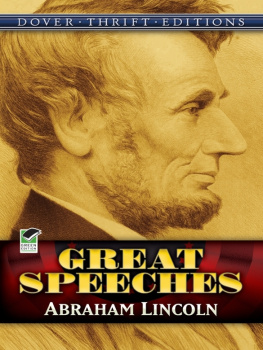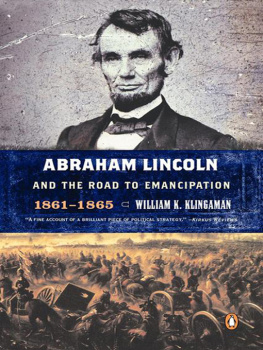Mourning Lincoln
Mourning Lincoln
Martha Hodes

Published with assistance from the Mary Cady Tew Memorial Fund.
Copyright 2015 by Martha Hodes.
All rights reserved.
This book may not be reproduced, in whole or in part, including
illustrations, in any form (beyond that copying permitted by Sections
107 and 108 of the US Copyright Law and except by reviewers for the
public press), without written permission from the publishers.
Yale University Press books may be purchased in quantity for educational,
business, or promotional use. For information, please e-mail
sales.press@yale.edu (US office) or sales@yaleup.co.uk (UK office).
Designed by Lindsey Voskowsky.
Set in Bulmer MT type by Integrated Publishing Solutions.
Printed in the United States of America.
Library of Congress Control Number: 2014952310
ISBN 978-0-300-19580-4
Catalogue records for this book are available from the
Library of Congress and the British Library.
This paper meets the requirements of ANSI/NISO Z39.481992
(Permanence of Paper).
10 9 8 7 6 5 4 3 2 1
For Linda
and
As ever, for Bruce
Contents
Mourning Lincoln

Good Friday, 1865
THE PLAY HAD ALREADY STARTED when the Lincolns arrived. As the honored guests made their way up the stairway to the dress circle, the actors stopped and the audience cheered. As the band struck up Hail to the Chief, the president took an impromptu bow. It was Good Friday, April 14, 1865.
The Washington Evening Star had carried a front-page advertisement for Laura Keenes appearance at Fords Theatre in the lighthearted comedy Our American Cousin, and an announcement inside indicated that the president and Mrs. Lincoln would be attending that night. The Lincolns had extended an invitation to General Ulysses S. Grant and his wife, Julia, and when they declined, to Assistant Secretary of War Thomas Eckert, who declined as well. Next down the list were Clara Harris and Major Henry Rathbone, who happily accepted. She was the daughter of a New York senator, and he, Claras stepbrother and fianc. It was an evening that would ruin their lives.
The presidential box, personally decorated by one of the Ford brothers for the occasion, hovered above stage left. Lincoln lowered himself into the walnut rocking chair, with Mary seated to his right. At perhaps a quarter past ten, the audience roared with laughter as the actor Harry Hawk, in the role of the backwoods American cousin of British relatives, uttered the line, Well, I guess I know enough to turn you inside out, old galyou sockdologizing old mantrap! Then came a pistol crack. Was it part of the play? An accidental firing by a soldier in the audience? Now a man leapt to the stagewas that part of the script? But hed jumped from the presidents box and caught one foot in the decorative swags, waving a knife. Some heard him shout, Sic semper tyrannis!Thus always to tyrants. Some heard, The South is avenged, and others heard nothing at all. It didnt seem like a play anymore, and for a split second everything froze. By the time the audience jolted from their seats, the gunman had vanished.

John Wilkes Booth fires into the back of Lincolns head. This 1865 lithograph shows Clara Harris seated next to Mary Lincoln while Henry Rathbone attempts to stop the assassin. Lincolns hand is grasping the drapery fashioned from an American flag.
LC-USZ62-2073, Prints and Photographs Division, Library of Congress.
Up in the presidential box, Clara Harriss hands and face were covered with blood, her clothes saturated. Henry Rathbone hadnt seen or heard a thing until the shot rang out. He had tried to prevent the assailant from vaulting to the stage, provoking the man to slash his arm from elbow nearly to shoulder. After that, Rathbone could only shout, Stop that man! Then Mary Lincoln thought that the blood all over Harris was her husbands and kept screaming, My husbands blood, my dear husbands blood! Now came shouts from the audience about murder and calls for doctors. People rushed the stage. Women fainted. Soldiers hurried in with bayonets.

John Wilkes Booth lands on the stage at Fords Theatre after jumping from the presidential box. In this engraving, Mary Lincoln and Clara Harris assist the wounded president while men in the audience jump to their feet, pointing at the assassin.
McLellan Lincoln Collection, John Hay Library, Brown University.
At 10:30 p.m., from Tenth Street outside Fords Theatre, the news traveled through the darkness, people shouting, rapping on windows, pounding on doors. Mounted patrols galloped through throngs of frightened people, with soldiers, sailors, and policemen everywhere. Members of the audience had recognized the intruder as the well-known Shakespearean actor John Wilkes Booth, and his name spread rapidly. Word came as well about Secretary of State William Seward: another man had knocked on the door of his Washington home at about 10:00 p.m., forced his way upstairs, and assaulted Seward right in his bed, where he was recuperating from a recent carriage accident. As the city embarked on a manhunt for the killer and his accomplices, trains and ferries were ordered halted, and guards stood posted at all roads leading out of the capital.
Booth and his recruited conspirators had at first planned to abduct the president and hold him hostage in exchange for wartime prisoners, but after Confederate general Robert E. Lee surrendered at Appomattox on April 9, they changed the scheme from kidnapping to murder. Simultaneous with Booths deed, three other men were set to carry out two related missions. George Atzerodt would kill Vice President Andrew Johnson in his suite at the Kirkwood House Hotel on Pennsylvania Avenue, and Lewis Powell would kill Seward while David Herold, on horseback, held Powells waiting horse for the escape. Atzerodt lost his nerve at the last minute, and Powells plan went awry when his ruse of delivering medicine to the ailing secretary of state failed. Instead, Powell violently fought his way into the Seward residence, where he shot Sewards grown son (he would recover), then stabbed the intended victim in his bed (he too would recover) before another son intervened. Powell managed to break free, but Herold, flustered by the screams coming from inside the house, had already galloped off on his own horse. Later that night, Herold would meet up with Booth, the two disappearing together into the surrounding countryside. Among the other conspirators were a carpenter at Fords Theatre, who briefly held on to Booths horse in the back alley; Dr. Samuel Mudd, who later that night would treat the broken bone Booth had sustained from his leap to the stage; and Mary Surratt, a widow who ran a Washington boardinghouse near the theater and owned a Maryland tavern, both of which were implicated in the conspiracy.
Unlike his collaborators, John Wilkes Booth had executed his portion of the plot nearly flawlessly. Three days earlier, on Tuesday, April 11, the twenty-six-year-old actor had stood among a crowd gathered outside the White House, listening to Lincoln deliver a victory speech about reconstructing the nation. When the president spoke of voting rights for black men, Booth was roused to fury. That means nigger citizenship, he uttered, according to a companion. Now, by God, Ill put him through. When Booth entered the box at Fords Theatre, he stood directly behind the president, aimed his derringer, and fired one shot into the back of Lincolns head.
Next page











